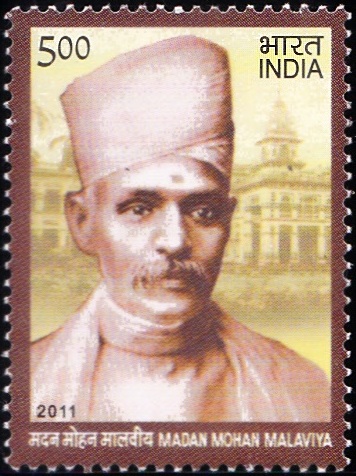
Pandit Madan Mohan Malaviya 2011
A commemorative postage stamp on the 150th Birth Anniversary of Mahamana Pandit Madan Mohan Malaviya, president of the Indian National Congress (1909, 1918, 1932 & 1933), founder of Hindu Mahasabha :
Issued on Dec 27, 2011
Issued for : Madan Mohan Malaviya, as rightly summed up by Jawaharlal Nehru, was a giant among men, and one of the foundation-layers of Indian nationalism. The Department of Posts remembers this great son of India in gratitude for the services rendered to the nation and issues a postage stamp to commemorate his 150th birth anniversary.
Credits :
Stamp/FDC : Sankha Samant
Cancellation : Alka Sharma
Type : Stamp, Mint Condition
Colour : Multi colour
Denomination : 500 Paise
Stamps Printed : 0.3 Million
Printing Process : Wet Offset
Printer : ISP Nashik
Name : Madan Mohan Malaviya
Born on Dec 25, 1861 at Allahabad, North-West Provinces, British India [now in Prayagraj, Uttar Pradesh]
Died on Nov 12, 1946 at Varanasi, Uttar Pradesh, India
About :
- Madan Mohan Malaviya was a multifaceted personality, remembered not just for his contributions to the freedom struggle, but also to education, journalism and social reform.
- Born in Allahabad on December 25,1861 to a family respected for their scholarship, Madan Mohan was a diligent student during his years of school and university education. He came to be widely known when as a spirited youth concerned about the future of his country, he delivered a moving speech at the Congress session in Calcutta in 1886. He returned to Allahabad and started a journalistic career as the editor of the Hindi weekly, the Hindustan. He also edited another weekly, the Indian Union.
- Malaviya participated in the annual Congress sessions regularly from 1886, and steadily acquired the status of a leader and an opinion maker. As his visibility in public life increased, he was elected to the Provincial Legislative Council in 1902 and to the Imperial Legislative Council in 1909. Through his articulation of the Indian situation on important issues like free and compulsory primary education, prohibition of recruitment of Indian indentured labour to British colonies and nationalization of railways, he came to be reckoned as one of the important members of the Imperial Council. Even while being a strong supporter of the Congress he founded the Hindu Mahasabha in 1906 the objective of which was not sectarian, but to oppose the “divide and rule” policy of the British Government. Malaviya‘s untiring zeal for public service led to his wide acceptance within the Congress as a man of substance, and he was elected President of the Indian National Congress in 1909. He went on to hold that position on three more occasions, in 1918,1932 and 1933.
- The Benaras Hindu University (BHU), founded by Malaviya at Varanasi in 1916 stands testimony to his keen interest in the education of the mind and the spirit. The importance that he attached to the economic development of the country made him combine the teaching of science and technology with that of religion. BHU today is one of the largest residential universities in the world, with nearly twenty thousand students, which includes 2500 research scholars and 650 foreign students from 34 countries.
- Malaviya was committed to the need for social change and reform in the country. He spoke strongly against the injustice done to the depressed classes and favoured raising the status of women in society. Malaviya was one of the earliest to appreciate the role of newspapers, particularly in Indian languages, in the education of the public. The journals started by him include the Abhyudaya and the Maryada in Hindi, and the Leader in English. He was the Chairman of the Board of Directors of the Hindustan Times from 1924 to 1946.
- Between 1924 to 1930, he played an active legislative role as a Member of the Central Legislative Assembly. As one of the leading lights of the freedom struggle, he was imprisoned by the British rulers twice during the Civil Disobedience Movement, between 1930 to 1932. Malaviya was one of the delegates to the second Round Table Conference in London in 1931, but returned dissatisfied with the approach of the British government. Though known for his gentleness and humility, Malaviya was firm on issues where principles were involved. He had the courage to express differences even with the Mahatma, for example, In matter of boycott of schools and colleges. He resigned from Congress Parliamentary Board in 1934 on the question of communal award.
- Text : P.N. Ranjit Kumar (Based on the inputs furnished by the proponent).


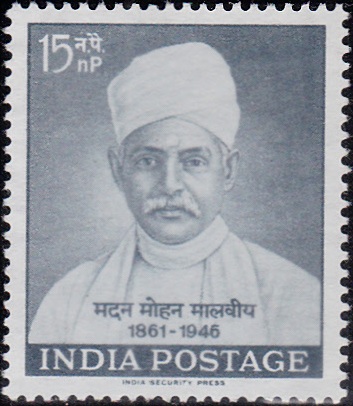
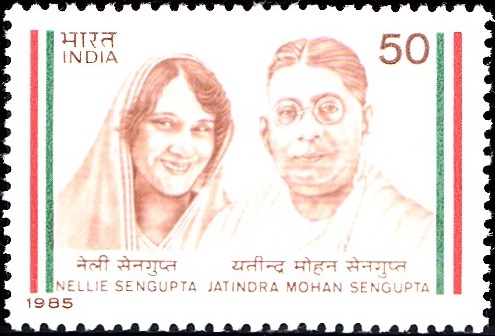
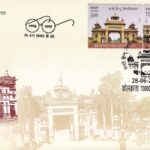
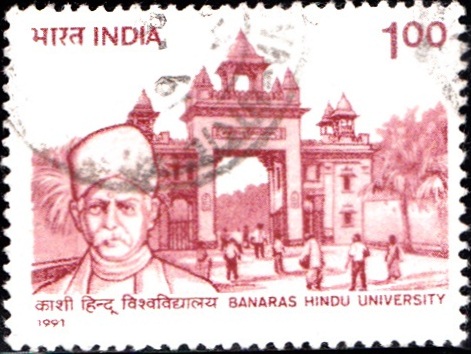

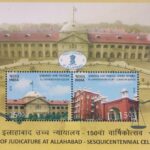
[…] from Gandhiji, GD was intimately associated with important leaders of his time like Gurudev Tagore, Pandit Madan Mohan Malaviya, C. R. Das, Lala Lajpat Rai, Motilal Nehru, Jawaharlal Nehru, Sardar Patel, Maulana Azad, Rajendra […]
[…] marks the centenary of the birth of four great Indians – Rabindranath Tagore, Motilal Nehru, Madan Mohan Malaviya and Profulla Chandra Ray. Each one of them made notable contributions to Indian national […]
[…] Banaras Hindu University, founded by Mahamana Pandit Madan Mohan Malaviya Ji in 1916 is the first truly residential Indian University established on the pattern of the […]